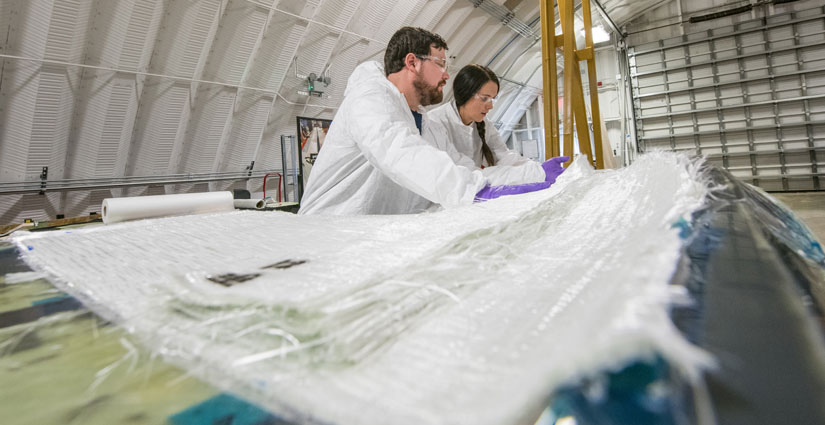Advanced Manufacturing and Materials
NLR's collaborative research and facilities enable scientists to push wind energy industry frontiers in advanced manufacturing and materials.

Novel manufacturing processes can boost domestic production capacity, enhance product reliability and recyclability, and reduce dependence on foreign supply chains—including critical minerals and materials. These innovations also help lower product costs and address key challenges such as transportation and assembly. NLR's wind energy and advanced manufacturing teams work with industry partners to realize these benefits through our Composites Manufacturing Education and Technology (CoMET) facility.
Capabilities
Materials Research and Applications
Researchers analyze U.S. and global supply chains, compiling information on quantity, uses, availability, and properties of critical minerals and materials for energy applications. Part of this work involves techno-economic modeling and analysis to understand the scope of the challenges.
R&D aims to develop new materials designed to use fewer resources, last longer, and recycle more easily. NLR is at the forefront of research into identifying and developing advanced composite materials, which would make wind turbine blades more recyclable while enabling them to be longer, lightweight, lower cost, and higher quality.
NLR is also accelerating the commercialization of additive manufacturing and next-generation technologies and processes such as new, low-cost, 3D-printable magnet materials.
Capabilities include:
- Identify and develop advanced composite materials
- Provide information on quantity, uses, availability, and properties of wind energy materials
- Accelerate commercialization of additive manufacturing and next-generation technologies and processes.
Manufacturing Processes at Scale
NLR performs foundational research into next-generation wind turbine manufacturing processes that will enable the United States to produce and export components and technologies while supporting a domestic workforce.
Capabilities include:
- 3D-printed, large-scale, composite blade structures and electromagnetic wind turbine generators
- Recyclable materials and thermoplastic resin systems
- Thermal welded/fusion-composite joining technologies
- Automated blade manufacturing processes
- Techno-economic modeling and analyses.
Manufacturing Optimization and Onsite/Modular Manufacturing
NLR staff researches how new and emerging technologies in material science, high-performance computing, automation, and 3D printing can impact large-scale wind turbine blade manufacturing. Our multipronged approach leads to lower costs as sandwich composite structures with high tolerance (high stiffness-to-weight and strength-to-weight ratios) enable onsite manufacturing and lighter blade structures for modular manufacturing.
Capabilities include:
- Wind turbine market and techno-economic analyses
- Topology optimization, large-scale 3D printing, additive materials properties, and additive design guidelines
- High-tolerance, repeatable, low-cost production technologies suitable for onsite and modular manufacturing.
Projects
The Manufacturing and Additive Design of Electric Machines by 3D Printing team is improving the performance of electric machines with reduced rare earth magnets for wind turbines through advanced design optimization and 3D printing.
The Institute for Advanced Composites Manufacturing Innovation brings together members of government, industry, national laboratories, and academia to address three technical goals, including lowering composite costs and energy use while increasing recyclability. Previous work at NREL focused on the development of a thermoplastic resin system for wind turbine blades. Current work is developing automation methods for advances in blade finishing during manufacturing.
NREL's groundbreaking thermoplastic resins, combined with thermal welding techniques pioneered by NREL and partners, offer the potential for stronger, less expensive, more quickly manufactured, and larger wind turbine blades, increasing energy capture, decreasing energy and transportation costs, and increasing blade reliability—critical to advancing the wind energy market.
Resources and Tools
Composites Manufacturing Education and Technology (CoMET) Facility (at NREL's Flatirons Campus)
Renewable Energy Materials Properties Database
Explore all of NREL's wind energy facilities and data and tools.
View all wind publications.
Partner With Us
Learn more about how to work with us.
Contact
Share
Last Updated Jan. 13, 2026
